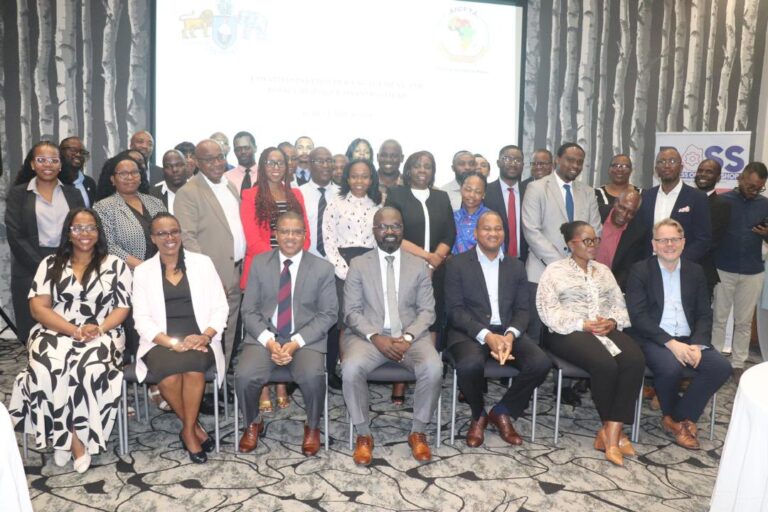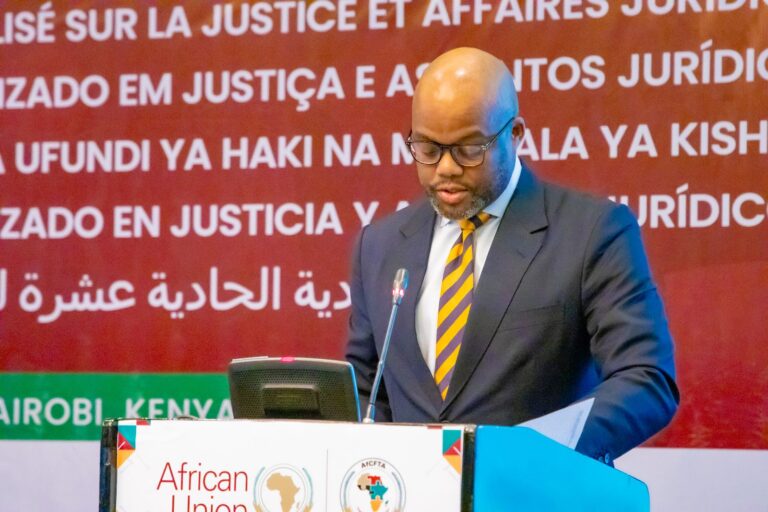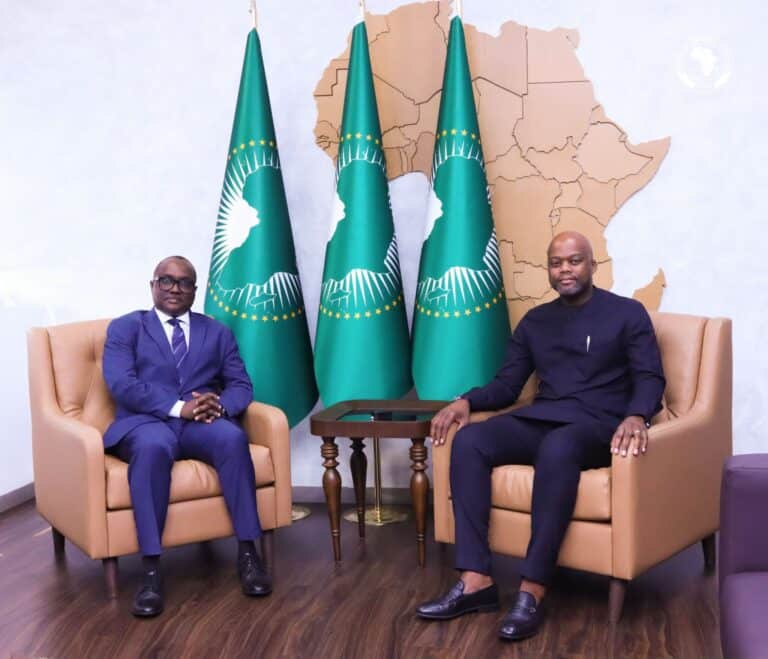The second day of the AfCFTA Business Forum took us straight to the nitty-gritty of the value chains, focusing on financing value chains, strengthening industrial capacity, and basically industrializing the continent. The discussions were lively, and the panelists had a wealth of knowledge to share, with three panel sessions and three parallel sessions.
Panel #1: Value Addition – Accelerating Africa’s Industrialisation through the AfCFTA
The first panel discussion of Day 2 focused on accelerating Africa’s industrialization through the AfCFTA by increasing value-addition in priority value chains such as agriculture, pharmaceuticals, textiles and clothing, and mining. The panel explored the policy tools required to establish or grow Africa’s manufacturing and industrial capacity, with notable contributions from industry experts and entrepreneurs. The session was moderated by Mark Eddo and included panellists such as Mr. Daniel Njiwa, Mr. Themba Khumalo, Ms. Flora Mutahi, Mr. Dominic McVey, and Mr. Chiza Charles Chiumya




Panel #2: HER AfCFTA: Women Driving Intra-Africa Trade in partnership with the UNDP
The HERAfCFTA panel discussion addressed the challenges that women face in intra-African trade and explored how to ensure their success in the AfCFTA. The panel was moderated by Dr. Joy Kategekwa, Senior Advisor to UNDP Africa Director, and the scene was set by H.E. Nardos Bekele-Thomas, CEO of AUDA NEPAD, and H.E. Ahunna Eziakonwa, Assistant Secretary-General and Director of UNDP’s Regional Bureau for Africa. The panellists included Dr. Amy Jadesimi, CEO of LADOL, who discussed trade and transport logistics, Natalie Jabangwe, Group Digital Executive Officer at Sanlam, who shared insights on digital entrepreneurship, and Precious Moloi-Motsepe, a fashion entrepreneur who highlighted the importance of supporting women-led businesses particularly by boosting their financial inclusion in digital platforms where they can easily make and accept payments.




Other panellists included Tiguidanke Camara, Founder and President of Tigui Holdings, Brigitte Harrington, CEO of Igire Coffee, and Temie Giwa Tubosun, CEO of LifeBank. The discussion also featured H.E. Sekai Nzenza, Minister of Industry and Commerce in Zimbabwe, and Hon. Bogolo Kenewendo, Former Minister of Trade and Investment of Botswana and Climate Champion’s Special Advisor, Africa Director, who provided government perspectives on the issue.
Ms. Chileshe Mpundu Kapwepwe, Secretary General of COMESA, also participated in the discussion, emphasizing the need to address the gender gap in trade and increase access to finance and markets for women. The HERAfCFTA panel highlighted the importance of mobilizing partnerships for impact and advancing concrete initiatives to ensure that women benefit from the AfCFTA.
Panel #3: Expanding Digital Trade and interoperable payments systems in the AfCFTA
The panel session on expanding digital trade and interoperable payment systems in the AfCFTA showcased the significant role of digital trade in creating quality jobs, reducing inequalities, and fostering digital inclusion in Africa. The session highlighted the significant investment made in building the fundamental infrastructure needed for the fintech industry, such as fiber optics, which is a major facilitator for market expansion and cross-border trade.
The panel also discussed the challenges faced in digital trade, such as the need for harmonized regulations and the lack of investment in the sector. The Digital Trade Protocol, currently under development, aims to harmonize rules and regulations to augment intra-Africa trade.
The panel was moderated by Michelle Chivunga, the CEO, and Founder of Global Policy House with notable panelists such as Nicholas Van Slyck, the Vice President of Africa and Asia at SBA Communications, Juliet Wangui Maina, representing M-PESA Africa Limited, Darlington Mandivenga, the CEO of Fintechs and Digital Platforms at Cassava Technologies, Isaac Kamuta, the Group Head of Payments & Cash Management at Ecobank South Africa, Gugulethu Siso, the Founder and CEO of Thumeza and Mike Ogbalu, the CEO of Pan African Payment and Settlement System. They spoke about the importance of regional integration and harmonization of regulations to support digital trade and about the challenges of cross-border trade and the need for interoperability in digital payments systems.
Parallel session #1: Building local pharmaceutical manufacturing and IPR capacity
The session on increasing production and intra-Africa trade in pharmaceuticals focused on the challenges and opportunities of scaling local production and reducing the dependence on imports, particularly for vaccines. Moderated by Glaudina Lootshe, the panelists which included experts in the pharmaceutical and development space such as Ms. Chimwemwe Chamdimba, Head of Health at AUDA-NEPAD, Mr. Stavros Nicolaou, Group Senior Executive, Strategic Trade from Aspen Pharma Group, Mr. Kevin Francis, Cluster Lead: SSA & Country Manager for Pfizer South Africa, Biovac Institute and a representative from Novartis, highlighted the high demand for finished pharmaceutical products in Africa, estimated at ~$18 billion annually, with the majority being met through imports totaling ~$11 billion. In contrast, demand met by trade from Africa is less than 3%, with vaccines accounting for less than 0.1%.




The panelists also discussed the barriers to scaling local production and intra-African trade, including the lack of markets at scale, competitiveness compared to other regions, lack of harmonization of standards and regulations across the continent, and insufficient transport and logistics. Their expert contributions highlighted the urgent need to prioritize the development of the pharmaceutical industry in Africa to improve public health outcomes and drive economic growth.
Parallel session #2: Boosting Agriculture and Agro-processing value chain under the AfCFTA
The AfCFTA presents an opportunity for Africa to transform its agricultural sector, which contributes over 60% of employment and more than a third of total GDP. This session aimed to identify the opportunities for agricultural trade within the AfCFTA and provide solutions to barriers in agricultural value chain development for trade and market access. The panelists discussed the need to promote agro-processing solutions to fully implement the AfCFTA, emphasizing the importance of building networks and partnerships to enhance intra-African trade.




Moderated by Komla Bissi, Senior Adviser at the AfCFTA Secretariat, the panel included Rex Owusu Marfo, Managing Director of Abaso Cocoa Processing, Yusuf Daya, Director of ARTP at Afreximbank, Daniel Njiwa, Head of Regional Food Trade at AGRA, Doris Emmanuel Malle, CEO of Mama Mia’a Soko, Amine Adoum, Director of Infrastructure, Trade and Industry, and Dr. Edwini Kessie, Director of Agriculture and Commodities at the World Trade Organization.
The discussion emphasized the importance of improving infrastructure, investing in research and development, and promoting value addition to increase competitiveness in international markets. The panelists also highlighted the need for coordinated efforts to address the challenges of market access and trade finance for small-scale farmers and agribusinesses. Overall, the session provided valuable insights into the opportunities and challenges of agricultural trade within the AfCFTA and the potential for agro-processing to drive economic development on the continent.
Parallel Session #3: Spotlight on the AfCFTA Hub
The session focused on the AfCFTA Hub, a digital ecosystem designed to connect e-government portals, business and consumer apps, and supranational platforms into one continental gateway. The Hub aims to simplify AfCFTA compliance and benefits for SMEs and startups, level the playing field in e-commerce and e-logistics, lower the costs of cross-sector and cross-border transactions, and increase trust across public and private channels and networks. Ultimately, it aims to deliver prosperity to every fingertip, doorstep, and hilltop in Africa.




The session provided an overview of the AfCFTA Hub and its intended contribution to accelerating AfCFTA implementation. The panelists included Nardos Bekele-Thomas, CEO of AUDA-NEPAD, Solomon Quaynor, Vice-President for Private Sector, Infrastructure and Industrialization at the African Development Bank, Busi Mabuza, Chairperson of the Industrial Development Corporation SA, Lerato Molebatsi, Board Member of SA Reserve Bank and Director of Cross Border Road Transport Agency (C-BRTA), Jas Bedi, Chairman of Bedi Investments, Mike Serame, Executive Head External Affairs of Vodacom Group, Abel Yifru, Regional Manager Southern Africa of Ethiopian Airlines, and Isaac Kamuta, Group Head Payment/Cash Management of Ecobank. The panelists discussed the ongoing progress of implementing various components of the Hub and share opportunities for collaboration with players in the government and private sector interested in joining and leveraging benefits of the AfCFTA Hub Network. The moderator for the session was Sophie Masipa, Director of Partnerships at AfroChampions.
Overall, day two was an exciting and informative day filled with discussions on how to strengthen the AfCFTA, with a focus on value chains, digital trade, and the pharmaceutical and agro-processing industries.


